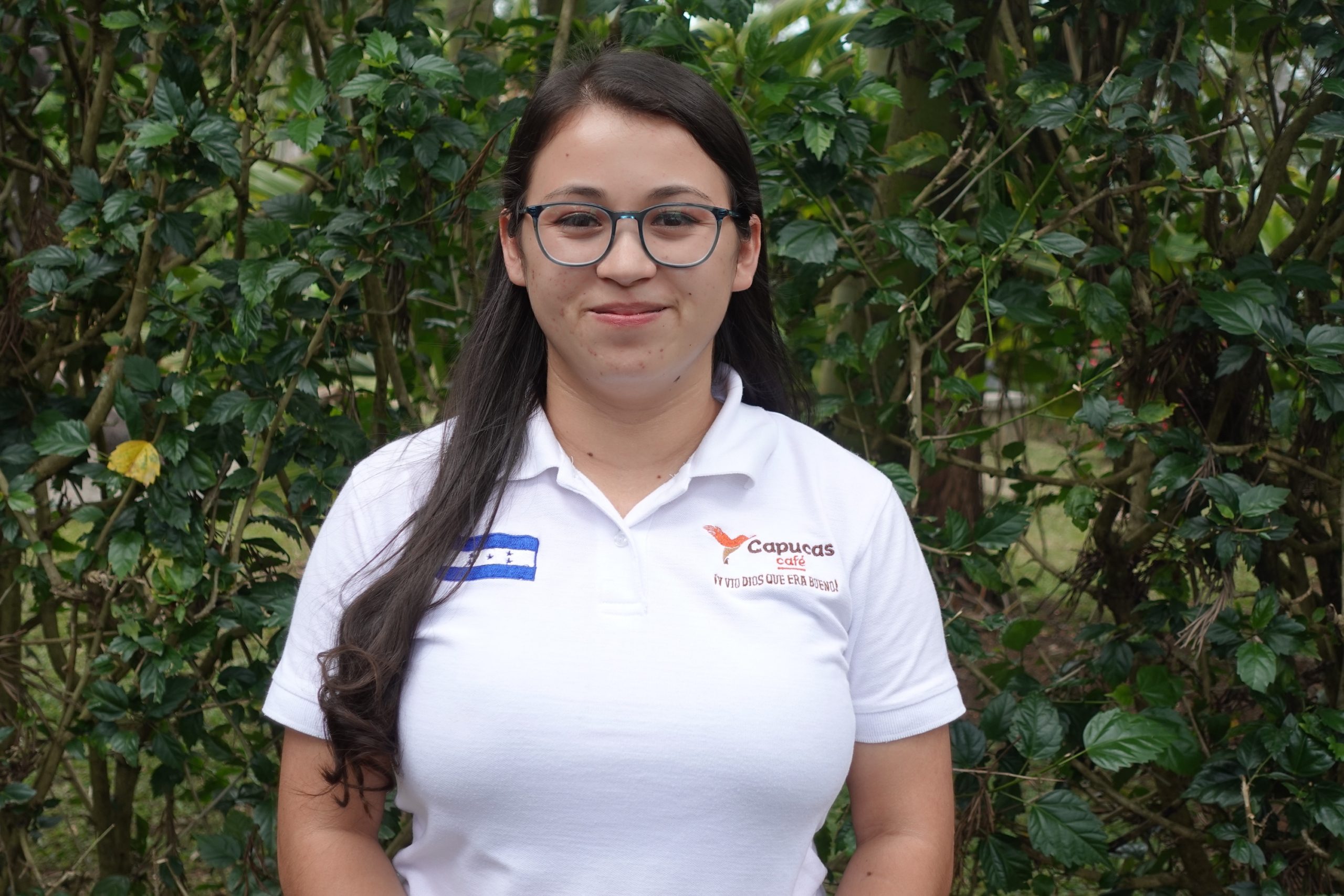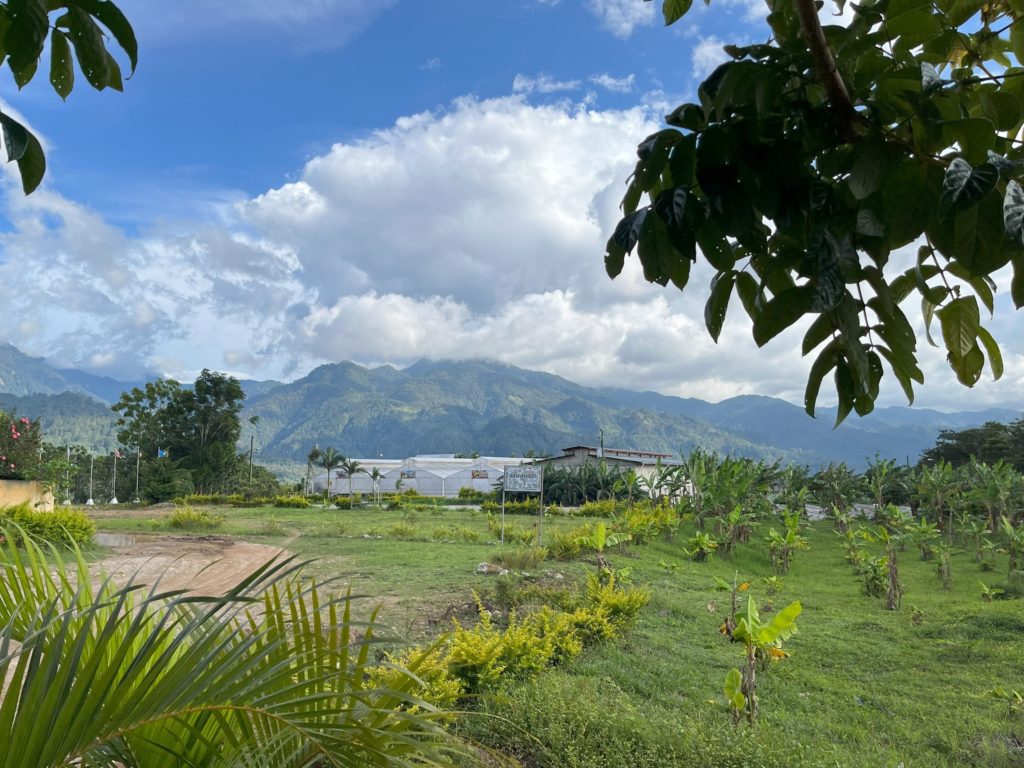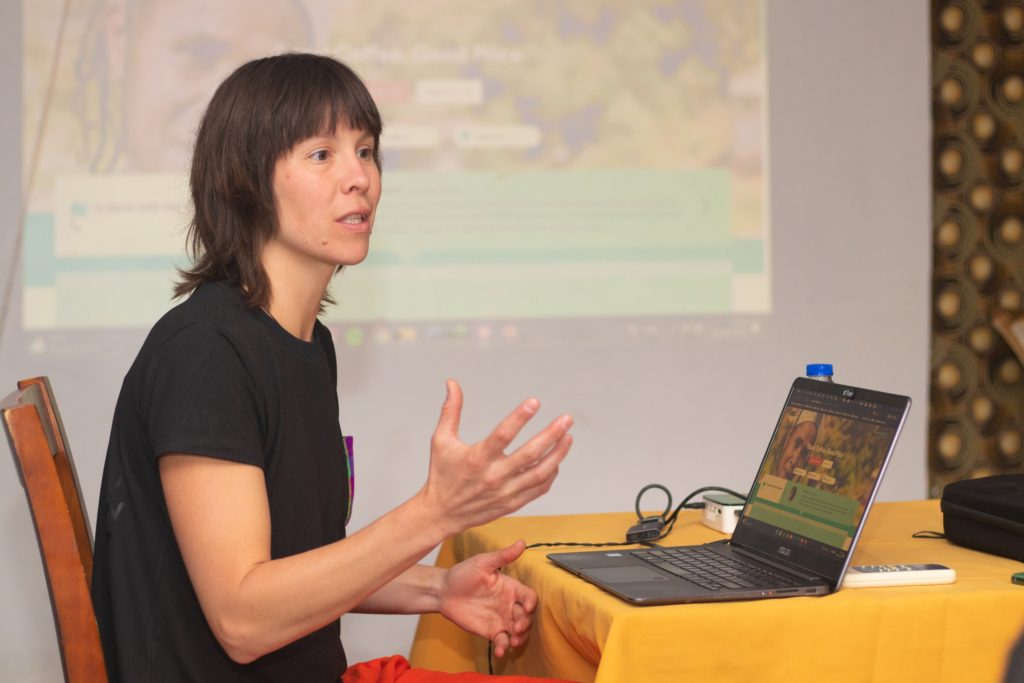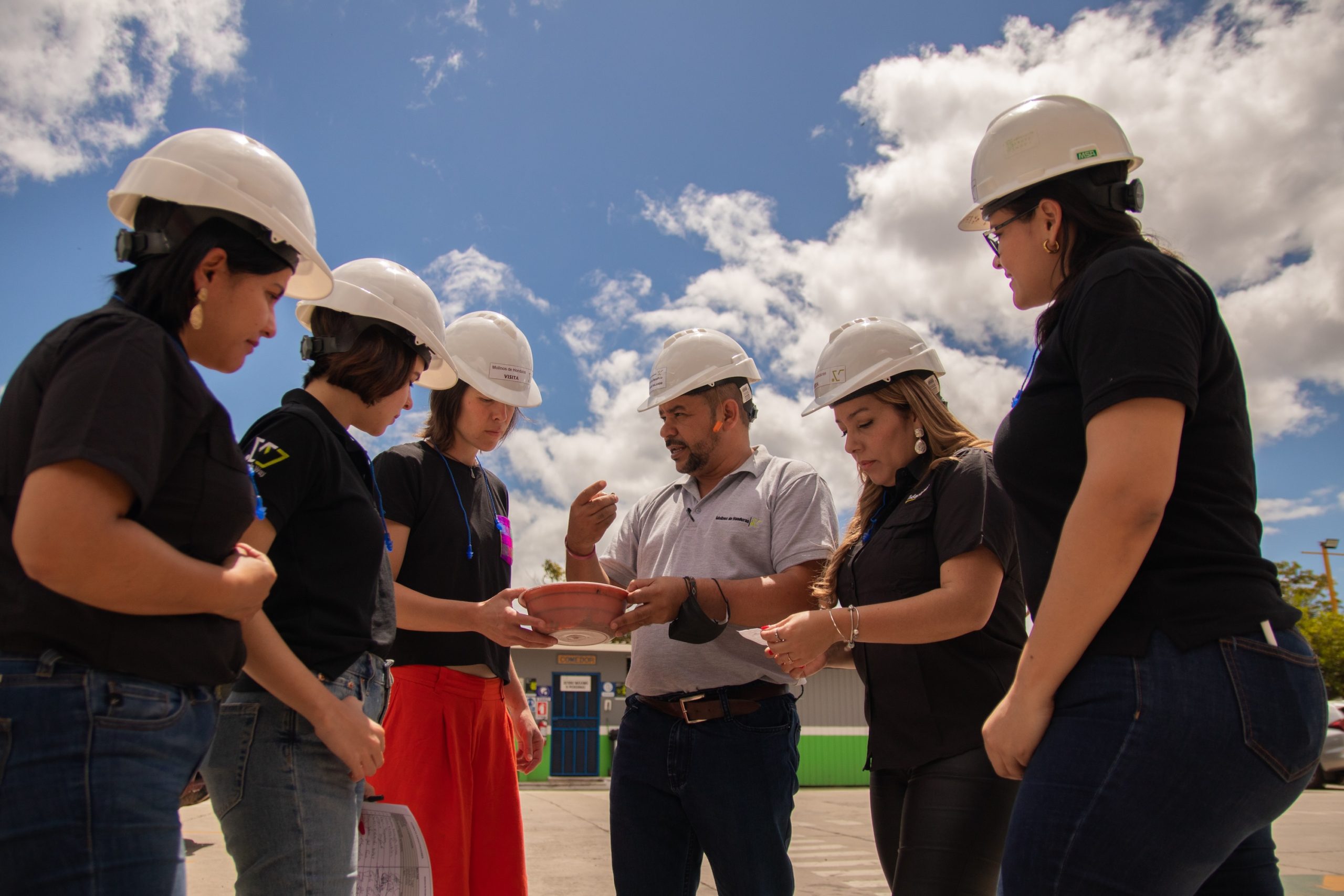More than a cooperative: From gender equality to technological innovation
Improving the position of women in coffee production as well as innovating coffee production itself – it sounds like a daunting task in conservative Honduras, but for young Angélica Paz it is a challenge she takes up daily, full of energy and optimism. Angélica is a project manager at the Honduran coffee cooperative Capucas; a cooperative that works closely together with Solidaridad and Fairfood under the RECLAIM Sustainability! programme.
This is an English adaptation of a story by Jan-Albert Hootsen that was originally published in the Power of Voices special of the Dutch magazine Vice Versa (June 2024).
Angélica Paz does not like to sit still. The project manager of Capucas, a cooperative of coffee farmers in western Honduras, has her own office in the main complex, but can be found outside more often than inside. “I like to be busy with anything and everything and there is always something to do,” she laughs. “When I finish one project, I move straight on to the next.”
The good-humoured Paz, not yet 30 years old, is pivotal in the growing success of what is officially called the Cooperativa Cafetalera Capucas Limitada (COCAFCAL), but is simply called Capucas or la cooperativa by the locals. It was founded in 1999 as an initiative to bring together local coffee farmers in the Copán region, provide them with new means of processing and selling coffee, and unite them by giving them decision-making power at Capucas. They now have over 700 members.

When farmers know what is happening to their coffee, they are better equipped to make decisions within the cooperative.
Angélica Paz repeats that number several times during the interview, and with pride: “The work at Capucas,” she says, “has ensured that farmers’ livelihoods are improving both economically and socially. We have made a lot of progress in our region, in many different areas.”
Capucas: ‘more than just coffee’
Capucas consists of a large complex of several buildings, in between numerous small fincas. The main building is reminiscent of a typical Latin American plaza, a square surrounded by offices, a shop, a restaurant and a meeting room, and the production heart of the cooperative: the metal and concrete, industrial-looking coffee roastery.
Scattered around the main building are several others, including a greenhouse where coffee beans are dried, and the office of an exclusively women-owned coffee brand. If you follow the muddy road at the entrance to the cooperative, you will arrive at a collection of cottages and a restaurant where guests can stay overnight.
Capucas is more than just coffee, Paz stresses. She points to the small clinic a little further down the road. “We have also made strides socially. For instance, there used to be a clinic here run by a doctor paid by the Ministry of Health, but now we pay for a doctor ourselves from the cooperative,” she explains. “And we have established Honduras’ very first ‘virtual school’.”
So it’s not just any cooperative. In addition to joining forces among farmers, providing support in processing and selling coffee, tapping into new markets and strengthening social cohesion in the community around the cooperative, Capucas is also very progressive.

Not only in terms of quality – the coffee produced is organic and has a number of certificates endorsing its special quality – but also in two areas where Honduras itself still has much ground to gain: the role of women in the cooperative and the use of new technologies.
Strengthening the farmers’ position starts with traceability
Angélica Paz plays a key role in both areas, in partnership with the organisations Fairfood and Solidaridad, which have been working closely with the cooperative for several years. She is the driver of the innovations Capucas is now implementing.
She talks about the introduction of Trace, Fairfood’s application that allows farmers to track their own coffee beans from the harvest to the cup of coffee elsewhere in the country, or the world, from their mobile phone. It is a highly innovative way of working in a traditional agricultural sector, which is dominated globally by multinationals making huge profits on mass production and sales of coffee, while farmers in countries like Honduras hardly benefit from the huge demand for their product.
The latter leads to what some economists call the ‘coffee paradox’: while the cups in Western coffee houses became increasingly expensive, farmers in Honduras saw bitterly little of that in return. For them, it was impossible to trace exactly where all that value was added to their product because the beans were traditionally sold to big companies – and from then on, the coffee disappeared from their sight, into the global production and distribution chain.
Trace is one of the innovations that aims to put an end to that unfair situation. By providing farmers with information about where their coffee ends up, they themselves have more insight and therefore more control over what happens to their product. And thus, according to Angélica Paz, Trace is crucial for improving the socio-economic position of farmers. ‘It ensures participation and the empowerment of producers,’ she says. ‘When farmers know what is happening to their coffee, they are better equipped to make decisions within the cooperative.’

It did take the members of Capucas a little while to get used to Trace. ‘At the beginning, there was some fear of such a new technology – some wondered what to do with it,’ laughs Paz. ‘That’s why we also reached out to the families, the women and the children. The younger generation in particular was interested: if the father was reluctant, we could still use the app by reaching out to the mother and the children.’
On the way to closing the gender equality gap
The gender gap is still wide in Honduras, a country where the classical notion of the man as the head and breadwinner of the family is deeply rooted in society. The idea that women can actively participate in the economy, run their own businesses and take control of coffee production is a novelty in many places, especially in rural areas. Not surprisingly, Paz and the RECLAIM Sustainability! programme’s progressive ideas on gender equality and empowerment of women took some time to really take root in Capucas.
“Not even that long ago, it was still unthinkable that women could head a finca, it just didn’t happen,” says Paz. “People said women should stay at home, that their role was that of doing the housework and taking care of the children. Especially at the beginning, it was very challenging. I had a lot of support from my boss here, but in the meetings there were a lot of men who were older than me – and as women, we always tend to limit ourselves a bit anyway.”
Nevertheless, during the nearly eight years since she joined Capucas, together with Solidaridad, they have managed to bring about a fundamental change in mentality in the cooperative. Anno 2023 (when this interview took place- ed.), there are countless women who manage coffee plantations themselves, who have a say in the decisions made by Capucas and who manage some or even all of the family’s income.

I think that a change in mentality is visible in the coffee sector in general – the taboo that only men can do it is being broken.
In doing so, Paz also notes something striking, referring to new technologies such as Trace: while men, as mentioned, are often somewhat reluctant to accept new technologies in coffee production, it is the women who embrace innovation within the cooperative, along with the younger members of the family.
“I dare say that at Capucas we have already achieved gender equality in a sense, through an awareness-raising process with Fairfood and Solidaridad,” says Paz, elated. “And it’s not just the women who are now aware that they can manage a finca; increasingly more men accept that.” And although Honduras as a whole still has a long way to go, she argues that it is not just Capucas that is undergoing these changes: “I think that a change in mentality is visible in the coffee sector in general – the taboo that only men can do it is being broken.”
Trace has helped considerably in the case of Capucas: after all, women can only gain more control over their own role in the sector if they know exactly how coffee production works.
An ageing coffee sector
“We now have more than 50 international buyers of our coffee,” she says. “Since last year, I have also been working with the cooperative on getting certified so we can sell coffee in China – and we succeeded, making us the first Honduran producer to gain access to the Chinese market.”
However, Capucas’ growth, innovation and success belies a shadow hanging over the Honduran coffee world as a whole: an ageing population working in the sector. The average age of coffee farmers in Honduras has risen to 55, and there is a serious lack of younger Hondurans willing to work in the sector.
She is therefore far from finished with her work at Capucas. Not so long ago, she travelled with Solidaridad to Colombia for a meeting with women from Latin America: a special experience, and not only because she went outside of Honduras for the first time; in contact with other women from the region, she also discovered that their experiences in the sector were similar.
“I would like to continue studying to do more projects,” she says enthusiastically. “I now have a licenciatura (the Latin American equivalent of a Bachelor of Arts, ed.), and I would like to pursue a master’s degree in project management. Capucas already has five national-level projects in Honduras – I would like to continue working on them.”
This story was originally published in Dutch in Vice Versa’s Power of Voices magazine special, featuring the work of various partnerships under Power of Voices, such as RECLAIM Sustainability!


